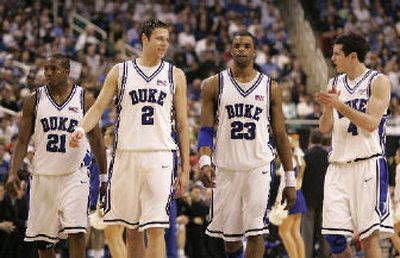A brainy twist on the NCAA pool

For Dan Gati, the most exciting night of March Madness isn’t the final game. Or any game, for that matter. Rather, it comes two days after the National Collegiate Athletic Association announces the seedings for the men’s tournament.
That’s when Mr. Gati presides over a “Calcutta” auction, an increasingly popular variation of the tournament betting pools that are so common among friends and co-workers nationwide.
Mr. Gati, a 29-year-old lawyer in New York, gathers a handful of friends in an Upper West Side apartment, with two or three more conferenced in on speaker phone, and conducts an auction for each of the 64 teams in the tournament. The money that’s collected will be distributed in the following weeks to the “owners” of the winning teams in each round of the tournament.
Last year, Mr. Gati and seven friends threw just under $7,000 into the pot with their bids. The big winner was Mike Kestenbaum, who collected $1,871 — just over a quarter of the pot — when a team he bought for $500 at the auction, the University of North Carolina, won the tournament.
“I decided to organize this auction for my friends because I have a lot of free time and I’m good with Excel,” says Mr. Gati, who has run his auction every year since 2001. (For serious Calcutta enthusiasts, computer proficiency is essential to calculating how much to bid on each team.) “As we get older and make more money, it gets more and more ridiculous.”
For recreational gamblers and sports fans long accustomed to the standard tournament office pool — where each participant picks the winner of every game before the tournament begins, and points are awarded for each correct pick — Calcutta-style auctions offer a livelier, and, proponents say, brainier way of betting on one of the biggest gambling events in all of sports.
Participants in a Calcutta auction often rely at least in part on gut instinct or team loyalty, just as they would in any bet. But the bidding process injects a strategic element that’s missing in the standard pool.
Calcutta auctions vary slightly according to the whims of the participants, but the basic setup goes like this: Teams are put up for bid in random order until all 64 are sold. There is no limit on the number of teams a bidder can buy. The number of games a team wins in the tournament determines the percentage of the pot the owner is awarded — a tiny sliver for teams that win only one game, all the way up to perhaps a quarter of the pot for the team that wins six games to take the championship.
In the broadest sense, the bidding is simple as well: Lower-seeded teams typically can be bought on the cheap, while highly ranked squads go for bigger bucks. But for many Calcutta fans, the fascination is in placing a value on each team, and then trying to buy a team for that amount or less. And that’s trickier than it might sound, because the value of every team fluctuates as the bidding progresses, since it depends in part on how much money ends up in the pot.
Many bidders conduct elaborate, computer-aided analyses to map out their bidding strategy, taking into account factors including past tournament results and auction histories, as well as each team’s prospective opponents. For those who aren’t quite up to doing the analysis themselves, there are plenty of pundits online who offer bidding advice, free or for a fee.
It’s all part of an annual gambling spree that the Federal Bureau of Investigation has estimated at nearly $2.5 billion in legal and illegal bets. Office pools and Calcuttas generally are illegal but rarely draw the attention of authorities, who focus their resources on bigger, continuing gambling operations where the organizer is taking a cut of the bets.
Still, it’s not easy to get gamblers to open up about the big-time Calcuttas, partly because gambling winnings are taxable, and also because some people are concerned that their employers or others would frown on their participation. And Calcuttas do get big. For the past decade, one 69-year-old lawyer in New York has run a Calcutta with a group of about 50 attorney friends. They gather at a bar on Long Island and run an auction similar to Mr. Gati’s. The difference: This auction runs well into six figures, with the annual pot reaching between $150,000 and $200,000, the lawyer says. The owner of the tournament winner gets 18 percent of the total.